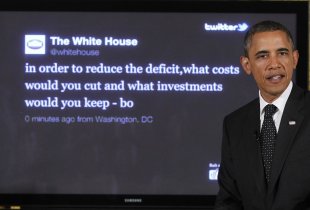WASHINGTON (AP) — In an ambitious road map for slashing the global spread of AIDS, the Obama administration says treating people sooner and more rapid expansion of other proven tools could help even the hardest-hit countries begin turning the tide of the epidemic over the next three to five years.
“An AIDS-free generation is not just a rallying cry — it is a goal that is within our reach,” Secretary of State Hillary Rodham Clinton, who ordered the blueprint, said in the report.
“Make no mistake about it, HIV may well be with us into the future but the disease that it causes need not be,” she said at the State Department Thursday.
President Barack Obama echoed that promise.
“We stand at a tipping point in the fight against HIV/AIDS, and working together, we can realize our historic opportunity to bring that fight to an end,” Obama said in a proclamation to mark World AIDS Day on Saturday.
Some 34 million people worldwide are living with HIV, and despite a decline in new infections over the last decade, 2.5 million people were infected last year.
Given those staggering figures, what does an AIDS-free generation mean? That virtually no babies are born infected, young people have a much lower risk than today of becoming infected, and that people who already have HIV would receive life-saving treatment.
That last step is key: Treating people early in their infection, before they get sick, not only helps them survive but also dramatically cuts the chances that they’ll infect others. Yet only about 8 million HIV patients in developing countries are getting treatment. The United Nations aims to have 15 million treated by 2015.
Other important steps include: Treating more pregnant women, and keeping them on treatment after their babies are born; increasing male circumcision to lower men’s risk of heterosexual infection; increasing access to both male and female condoms; and more HIV testing.
The world spent $ 16.8 billion fighting AIDS in poor countries last year. The U.S. government is the leading donor, spending about $ 5.6 billion.
Thursday’s report from PEPFAR, the President’s Emergency Plan for AIDS Relief, outlines how progress could continue at current spending levels — something far from certain as Congress and Obama struggle to avert looming budget cuts at year’s end — or how faster progress is possible with stepped-up commitments from hard-hit countries themselves.
Clinton warned Thursday that the U.S. must continue doing its share: “In the fight against HIV/AIDS, failure to live up to our commitments isn’t just disappointing, it’s deadly.”
The report highlighted Zambia, which already is seeing some declines in new cases of HIV. It will have to treat only about 145,000 more patients over the next four years to meet its share of the U.N. goal, a move that could prevent more than 126,000 new infections in that same time period. But if Zambia could go further and treat nearly 198,000 more people, the benefit would be even greater — 179,000 new infections prevented, the report estimates.
In contrast, if Zambia had to stick with 2011 levels of HIV prevention, new infections could level off or even rise again over the next four years, the report found.
Advocacy groups said the blueprint offers a much-needed set of practical steps to achieve an AIDS-free generation — and makes clear that maintaining momentum is crucial despite economic difficulties here and abroad.
“The blueprint lays out the stark choices we have: To stick with the baseline and see an epidemic flatline or grow, or ramp up” to continue progress, said Chris Collins of amFAR, the Foundation for AIDS Research.
His group has estimated that more than 276,000 people would miss out on HIV treatment if U.S. dollars for the global AIDS fight are part of across-the-board spending cuts set to begin in January.
Thursday’s report also urges targeting the populations at highest risk, including gay men, injecting drug users and sex workers, especially in countries where stigma and discrimination has denied them access to HIV prevention services.
“We have to go where the virus is,” Clinton said.
Health News Headlines – Yahoo! News











